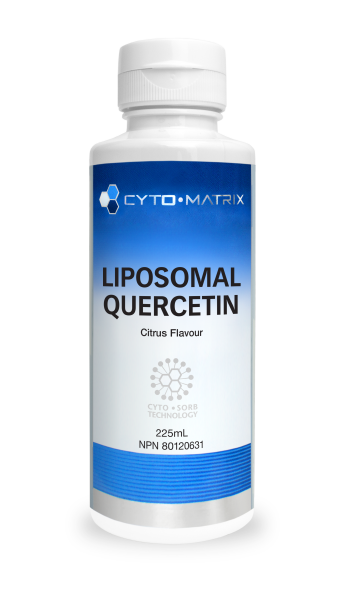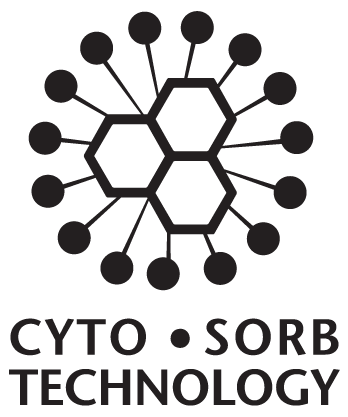Liposomal Quercetin – Citrus
- 166.6mg of micellar liposomal quercetin per teaspoon, designed to overcome the naturally poor bioavailability of standard quercetin supplements
- Patented Cyto-Sorb™ technology utilizes a two-phase emulsion process with phosphatidylcholine sourced from non-GMO sunflower, vitamin E and organic coconut vegetable glycerin to create these micellar liposomes and drastically improve the bioavailability, stability and sustained release of quercetin
- Indicated for mast cell stabilization and anti-histamine action in order to manage and treat allergic and inflammatory responses such as hay fever and non-bacterial prostatitis
- Each teaspoon provides 166.6mg of micellar liposomal quercetin in a citrus flavour
- 225mL per bottle offers 45 servings
Allergic rhinitis, more commonly referred to as “hay fever”, is the most common form of allergy and presents with inflammation in the nose and respiratory airway after exposure to an airborne allergen. Individuals with allergic rhinitis may experience a runny or stuffy nose, sneezing, itchy throat, watery eyes or headaches.
Other forms of allergies may present with skin rashes, itchiness, redness or digestive concerns. Regardless of whether the immune system is reacting to dust, cats, freshly cut grass, pollen or certain foods, the body is producing an excessive immune response, which consists of many pro-inflammatory chemicals. One of these chemicals is known as histamine and it is the chemical often responsible for the uncomfortable allergy symptoms.
Quercetin is a natural flavonoid compound that is most abundantly found in apples, onions, tea and berries. Clinically, quercetin is most well-known for its ability to stabilize mast cells, prevent histamine release, and prevent and manage allergic responses including allergic rhinitis. An additional benefit of quercetin is its cardioprotective nature. It helps to prevent the oxidation of LDL cholesterol, a process that initiates the stiffening of blood vessels in heart disease. Quercetin has also been shown to have gastroprotective, anti-cataract, anti-inflammatory and anti-viral effects. A combination of its immune modulating capabilities and these actions may explain why research has found that it can be effective in cases of chronic nonbacterial prostatitis.
With all of this in mind, there is one well-known concern with quercetin and that is its poor bioavailability. Some research suggests that the bioavailability of oral quercetin could be as low as 1%. Aside from the obvious local benefits of quercetin on the digestive tract lining and subsequent systemic health benefits as a result of enhanced immune regulation, there is good reason to improve the bioavailability of quercetin in order to provide even further health benefits at the tissue level. Liposomal Quercetin by Cyto-Matrix delivers quercetin in a micellar liposome formulation, offering a solution to the poor bioavailability of a standard quercetin supplement.
Liposomal delivery systems were originally developed to optimize the pharmacokinetics and efficacy of pharmaceutical drugs. These same principles have now been applied to natural health ingredients. A liposome consists of either a single-layered or multi-layered phospholipid structure with an aqueous core. Active ingredients can be placed inside the aqueous core or within the phospholipid bilayer, where they are protected from various enzymatic and digestive processes. Ultimately, liposomes provide improved bioavailability for active ingredients.
However, not all liposomal deliveries are created equal. Liposomes are several hundred nanometers in size, which means that there is still a significant amount of digestion that must occur to decrease surface area and allow for proper absorption. Micelles, on the other hand, are significantly smaller and can be absorbed directly at ~20 nanometers in size.
Liposomal Quercetin by Cyto-Matrix utilizes a unique and patented technology, Cyto-Sorb™, in order to create a stable multi-layered liposome with additional micellar delivery of quercetin. These methods allow for micronutrient stability and improved bioavailability, while also promoting the delivery of active ingredients to the intestinal sites of absorption in a sustained release fashion. Cyto-Sorb liposomal formulas are produced through a two-phase emulsion process utilizing phosphatidylcholine sourced from non-GMO sunflower, vitamin E and organic coconut vegetable glycerin. Potassium bicarbonate is strategically added to stabilize the active ingredient, prevent oxidation and improve flavour.
Liposomal Quercetin by Cyto-Matrix provides 166.6mg of quercetin per teaspoon in a delicious citrus flavour for improved compliance, to offer improved anti-histamine and anti-inflammatory responses.
Unit of Measure above:
Each 5mL teaspoon
| Ingredient | Amount |
|---|---|
| Quercetin (quercetin dihydrate) | 166.6mg |
| Vitamin E (d-alpha tocopherol) | 10IU (6.7mg AT) |
Non-Medicinal Ingredients:
Citric acid, citrus flavour, flavour, glycerin, phosphatidylcholine, potassium bicarbonate, purified water, sugars (xylitol), sunflower oil.
Directions for Use:
Adults (19 years and older) - Take 1 teaspoon per day with food. Ask a healthcare professional for use beyond 12 weeks. Shake before use.
Cautions:
Ask a healthcare professional prior to use if • you are pregnant • you are breastfeeding. Keep out of reach of children.
Other Information: Do not use if safety seal is broken. Refrigerate after opening.
Allergic rhinitis, more commonly referred to as “hay fever”, is the most common form of allergy and presents with inflammation in the nose and respiratory airway after exposure to an airborne allergen. Individuals with allergic rhinitis may experience a runny or stuffy nose, sneezing, itchy throat, watery eyes or headaches.
Other forms of allergies may present with skin rashes, itchiness, redness or digestive concerns. Regardless of whether the immune system is reacting to dust, cats, freshly cut grass, pollen or certain foods, the body is producing an excessive immune response, which consists of many pro-inflammatory chemicals. One of these chemicals is known as histamine and it is the chemical often responsible for the uncomfortable allergy symptoms.
Quercetin is a natural flavonoid compound that is most abundantly found in apples, onions, tea and berries. Clinically, quercetin is most well-known for its ability to stabilize mast cells, prevent histamine release, and prevent and manage allergic responses including allergic rhinitis. An additional benefit of quercetin is its cardioprotective nature. It helps to prevent the oxidation of LDL cholesterol, a process that initiates the stiffening of blood vessels in heart disease. Quercetin has also been shown to have gastroprotective, anti-cataract, anti-inflammatory and anti-viral effects. A combination of its immune modulating capabilities and these actions may explain why research has found that it can be effective in cases of chronic nonbacterial prostatitis.
With all of this in mind, there is one well-known concern with quercetin and that is its poor bioavailability. Some research suggests that the bioavailability of oral quercetin could be as low as 1%. Aside from the obvious local benefits of quercetin on the digestive tract lining and subsequent systemic health benefits as a result of enhanced immune regulation, there is good reason to improve the bioavailability of quercetin in order to provide even further health benefits at the tissue level. Liposomal Quercetin by Cyto-Matrix delivers quercetin in a micellar liposome formulation, offering a solution to the poor bioavailability of a standard quercetin supplement.
Liposomal delivery systems were originally developed to optimize the pharmacokinetics and efficacy of pharmaceutical drugs. These same principles have now been applied to natural health ingredients. A liposome consists of either a single-layered or multi-layered phospholipid structure with an aqueous core. Active ingredients can be placed inside the aqueous core or within the phospholipid bilayer, where they are protected from various enzymatic and digestive processes. Ultimately, liposomes provide improved bioavailability for active ingredients.
However, not all liposomal deliveries are created equal. Liposomes are several hundred nanometers in size, which means that there is still a significant amount of digestion that must occur to decrease surface area and allow for proper absorption. Micelles, on the other hand, are significantly smaller and can be absorbed directly at ~20 nanometers in size.
Liposomal Quercetin by Cyto-Matrix utilizes a unique and patented technology, Cyto-Sorb™, in order to create a stable multi-layered liposome with additional micellar delivery of quercetin. These methods allow for micronutrient stability and improved bioavailability, while also promoting the delivery of active ingredients to the intestinal sites of absorption in a sustained release fashion. Cyto-Sorb liposomal formulas are produced through a two-phase emulsion process utilizing phosphatidylcholine sourced from non-GMO sunflower, vitamin E and organic coconut vegetable glycerin. Potassium bicarbonate is strategically added to stabilize the active ingredient, prevent oxidation and improve flavour.
Liposomal Quercetin by Cyto-Matrix provides 166.6mg of quercetin per teaspoon in a delicious citrus flavour for improved compliance, to offer improved anti-histamine and anti-inflammatory responses.
Unit of Measure above:
Each 5mL teaspoon
| Ingredient | Amount |
|---|---|
| Quercetin (quercetin dihydrate) | 166.6mg |
| Vitamin E (d-alpha tocopherol) | 10IU (6.7mg AT) |
Non-Medicinal Ingredients:
Citric acid, citrus flavour, flavour, glycerin, phosphatidylcholine, potassium bicarbonate, purified water, sugars (xylitol), sunflower oil.
Directions for Use:
Adults (19 years and older) - Take 1 teaspoon per day with food. Ask a healthcare professional for use beyond 12 weeks. Shake before use.
Cautions:
Ask a healthcare professional prior to use if • you are pregnant • you are breastfeeding. Keep out of reach of children.
Other Information: Do not use if safety seal is broken. Refrigerate after opening.


